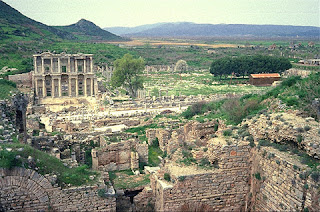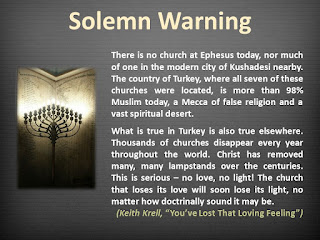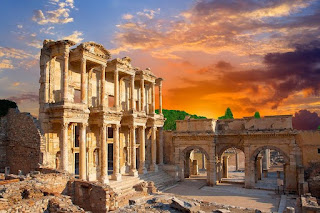THE LIVES OF THE PATRIARCHS #202 | THE LIFE OF MOSES #183
Pastor Christopher Choo
Lesson 3888
THE LIVES OF THE PATRIARCHS #202
THE LIFE OF MOSES #183
MOSES AT MT.SINAI#82
THE TABERNACLE OF MOSES ( Part 41)
THE MENORAH #11
JESUS' WARNING TO THE CHURCH AT EPHESUS HE WOULD REMOVE THEIR LAMPSTAND ( MENORAH )
Jesus said He is the Light of the World.
In John 8:12 His words were thus recorded: " I
am the light of the world. Whoever follows Me will never walk in darkness, but will have the light of life. ... When I am in the world, I am the Light of the World."
As His disciples we are to reflect His glorious light to the world as well.
Imagine a scenario when the church at Ephesus was warned that they had lost their first love - the light and warmth of the Agape love of God.
As a result if they forget that first love and do not repent, Jesus would remove their Lampstand ( Menorah: the Holy Spirit) from their midst. If that happens, they would go into spiritual darkness and maintenance mode, even running on empty, playing church, having a form of godliness while denying its power.
Sounds familiar?
Church history will attest that the Church lost its first love three hundred years after our Lord ascended into heaven. Today the original church at Ephesus is lost in a grand pile of ruins where thousands of tourist visit each year - not pilgrims. Our study tour group found the library of Celsius and even the ancient brothel and stadium but not the synagogue nor the house of Tyrannus where Paul taught. Sadly the Christian presence is altogether gone.
Let us learn not to repeat their mistake.
Jesus commended them at first (Revelation 2:2-3).
The Ephesian church was a hard-working group of believers full of fortitude. Also to their credit, they were gate-keepers of the truth and did not compromise with evildoers, and they showed patient endurance in bearing up under hardship.
However, Jesus also notes their shortcoming: “Yet I hold this against you: You have forsaken your first love” (Revelation 2:4). They were hard-working, but they no longer had the same passion for Christ as when they first believed. Their work was no longer motivated by love.
Jesus called the Ephesians to repent: “Remember the height from which you have fallen! Repent and do the things you did at first” (Revelation 2:5). In this case, the corrective was to remember the heights of their former love, repent (change their mind about their current status), and return to their previous way of doing things. It was time for revival in the church.
Jesus warns His church of impending judgment if they did not repent: “I will come to you and remove your lampstand from its place” (Revelation 2:5b).In other words, their punishment would be the disbanding or destruction of the Ephesian church. The light in Ephesus would go out.
In the above verses, we read Jesus' twofold command to the church at Ephesus: remember and repent. He calls upon the church at Ephesus to remember the love from which it had fallen. Their commitment to truth was a good thing, but unless it is motivated by love, that obedience is not fully pleasing to God (Revelation 2:1–4).
The New Testament places a high priority on love for the Lord. Jesus taught that our love for Him must exceed our love for our closest relatives (Matthew 10:37). The apostle Paul indicated that our love for the Lord should exceed our love for our spouse (1 Corinthians 7:32–35). In 1 Corinthians 13:3 He declared that even voluntarily dying as a martyr amounts to nothing if love is absent.
Jesus commanded the church at Ephesus to repent. The Ephesian believers needed to reverse their spiritual decline and serve Him as they did when the church began. A failure to heed Jesus' command would bring swift punishment. The church would not continue to exist as a witness for Jesus.
More than a few churches in our modern era have closed their doors because they abandoned their love for Jesus. In London, churches have been converted into pubs.
It is a sad fact that the church at Ephesus eventually ceased to exist. It simply was no more. But perhaps that was better than to continue as a church when Jesus was absent
The message to the church at Ephesus ends with this promise to the overcomers: “I will give the right to eat from the tree of life, which is in the paradise of God” (Rev. 2:7). The word “paradise” refers to the personal presence of the Lord Jesus.
CONCLUSION
To those who are faithful, Christ promises continued, intimate fellowship in paradise, sustained at the “tree of life” throughout eternity ( which is another symbol of the Menorah and of Jesus ).
May our ears hear and positively respond to the words of commendation, rebuke, warning, and invitation from the Word of God.








